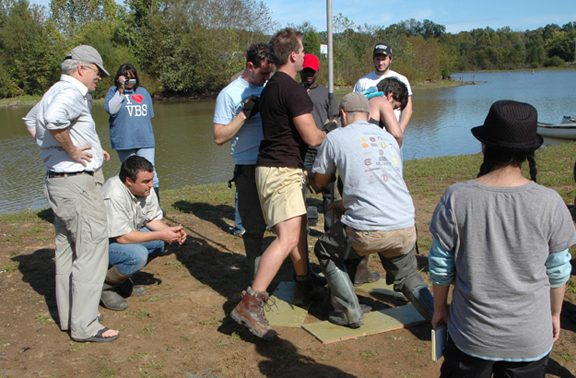Sedimentation Study Provides Valuable Benefits

Helping a local utility solve its environmental challenges and at the same time providing students with valuable field experience, researchers from UNC Charlotte’s IDEAS Center are performing sedimentation studies on Lake Howell in Cabarrus County, North Carolina.
The sedimentation research is part of the Infrastructure, Design, Environment and Sustainability (IDEAS) Center’s ongoing relationship with the Water and Sewer Authority of Cabarrus County (WSACC). The research is being led by Regina Guyer of the IDEAS Center’s Environmental Assistance Office (EAO), and by Dr. John Diemer and Dr. Craig Allan of the Department of Geography and Earth Sciences.
“As part of our ongoing research with WSACC,” Ms. Guyer said, “we’re looking at sedimentation and nutrient loading in the Lake Howell watershed. We’re trying to develop a clearer understanding of transport paths and quantify the fluctuations in sedimentation and nutrient loads.”
Lake Don T. Howell is a 1,300-acre reservoir that provides raw water supply for two water treatment plants. In recent years there have been problems with heavy sedimentation filling in the upper part of the lake.
“Sedimentation is fundamentally damaging, because you lose the volume of the water supply, which decreases holding capacity and compromises the lake’s ability to supply water,” Ms. Guyer said. “It is also important to understand the impacts of increased organic levels and nutrients on water quality and drinking water treatment processes.”
So the call to action has come in for UNC Charlotte’s watercraft affectionately known as the “deep-pond drilling platform”, which has two canoes joined together by a platform deck. Using the drilling platform, students from the UNC Charlotte GEOL 3124 Sedimentology class are learning to do coring to determine the depth and characteristics of deposits at the head of the lake.
“A big win for us from this project is the amount of student involvement and community engagement,” Ms. Guyer said, “which is central to the EAO’s mission of increasing sustainable pollution prevention in the region while providing our students out-of-classroom practical learning experiences.” The research has also been instrumental for Michael Wolfe, Infrastructure and Environmental Systems Ph.D. student, as part of his graduate research studies.
Work done in 2011 has been to establish baseline data for sediment and nutrients entering Lake Howell. Once the sediment and nutrient fluxes are characterized, the researchers will develop methods and plans to reduce the impacts of sediments and nutrients on the water quality of Lake Howell.